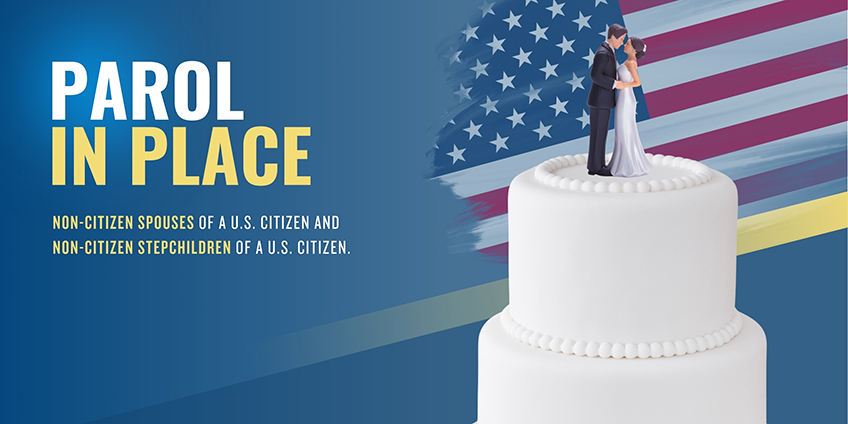Miami
Hialeah
Houston
- (305) 261-7000
- HABLAMOS:
 Español
Español
 Español
Español

The new program known as Keeping Families Together opens new opportunities for many immigrants who may benefit from temporary stay permission or parole. Below, you can find all the details about who qualifies and the legal aspects involved in the process. If you need legal advice, you can contact us at (305) 261-7000, and we will answer all your questions on this topic.
If you are a non-citizen spouse of a U.S. citizen, you must meet the following requirements:
If you are a non-citizen stepchild of a U.S. citizen, you must meet the following criteria:
USCIS FEE: $580
To request parole in place under Keeping Families Together, you must submit Form I-131F, online with the applicable filing fee.
After filing Form I-131F, you will need to provide biometric data, including fingerprints, photographs, and a signature.
If you meet the eligibility criteria for the “Keeping Families Together” program, you may be considered for a discretionary grant of parole on a case-by-case basis. The relevant authorities and/or immigration services will determine whether a grant of parole in place is justified based on significant public benefit or urgent humanitarian reasons in your case, and whether you merit a favorable exercise of discretion. In the case-by-case evaluation of your request, your criminal record, the existence of deportation proceedings and unexecuted final deportation orders, the results of background checks, which include national and public security evaluations, positive and negative factors you present, and any other relevant information available or requested by USCIS will be considered.
If you have disqualifying criminal records, or if you in any way constitute a threat to national security, public safety, or border security, at the discretion of the relevant authorities, your request for parole in place will be denied. Any pending criminal charge, regardless of the nature of the charge, will make you ineligible for parole in place under the Keeping Families Together program while the charge remains pending. Some criminal convictions will also make you ineligible for parole in place under this process. All other convictions, aside from non-disqualifying minor traffic offenses, will result in a rebuttable presumption of ineligibility for this process.
If you are granted parole in place, your parole will generally be granted for a period of up to 3 years. Parole can be terminated at any time with prior notice.
If you are granted parole, you will also be eligible to apply for an Employment Authorization Document (EAD) by filing Form I-765, Application for Employment Authorization.
If your request for parole in place under Keeping Families Together is denied, a Notice to Appear (NTA) will generally not be issued, nor will your case be referred to U.S. Immigration and Customs Enforcement (ICE) for possible enforcement action solely based on the denial, unless DHS determines, at its discretion, that you pose a threat to national security, public safety, or border security.
If you do not already have a Social Security Number (SSN), we recommend that you apply for one using Form I-765 and following the form instructions. If you request an SSN and your Form I-765 is approved, that information will be sent to the Social Security Administration, and they will assign you an SSN and issue you a Social Security card. They will mail your Social Security card directly to the address you provide on Form I-765.
If you have been granted parole in place through the Keeping Families Together program, your parole will automatically terminate if:
DHS may also decide to terminate your parole upon written notice at any time, at its discretion.
A grant of parole in place through the Keeping Families Together program does not authorize re-entry into the United States if you decide to leave. If you leave the United States after being granted parole in place, your parole period will automatically terminate. If you leave the United States without first obtaining an Advance Parole Document, you run a significant risk of not being able to return to the United States and you may also be ineligible for future immigration benefits.
WARNING: Traveling outside the United States, even with advance parole, can have serious immigration-related consequences, including potential inadmissibility or the execution of a pending deportation order. Parole into the United States is not guaranteed, even if advance parole has been granted before leaving the country. You are still subject to immigration inspection at a U.S. port of entry to determine whether you can be admitted to the United States and whether you are eligible for the immigration status you seek. It is strongly recommended that you consult with a qualified attorney or accredited representative before any travel outside the United States.
A grant of parole in place does not by itself establish eligibility for adjustment of status to lawful permanent resident under INA section 245(a). If granted parole in place, the noncitizen would need a qualifying family member to file Form I-130 on their behalf or file Form I-360 on their own behalf. The noncitizen would also need to file Form I-485, Application to Register Permanent Residence or Adjust Status, and possibly Form I-601, Application for Waiver of Grounds of Inadmissibility, if needed.
Article by Carmen Gallardo, Ezq. Manager Partner